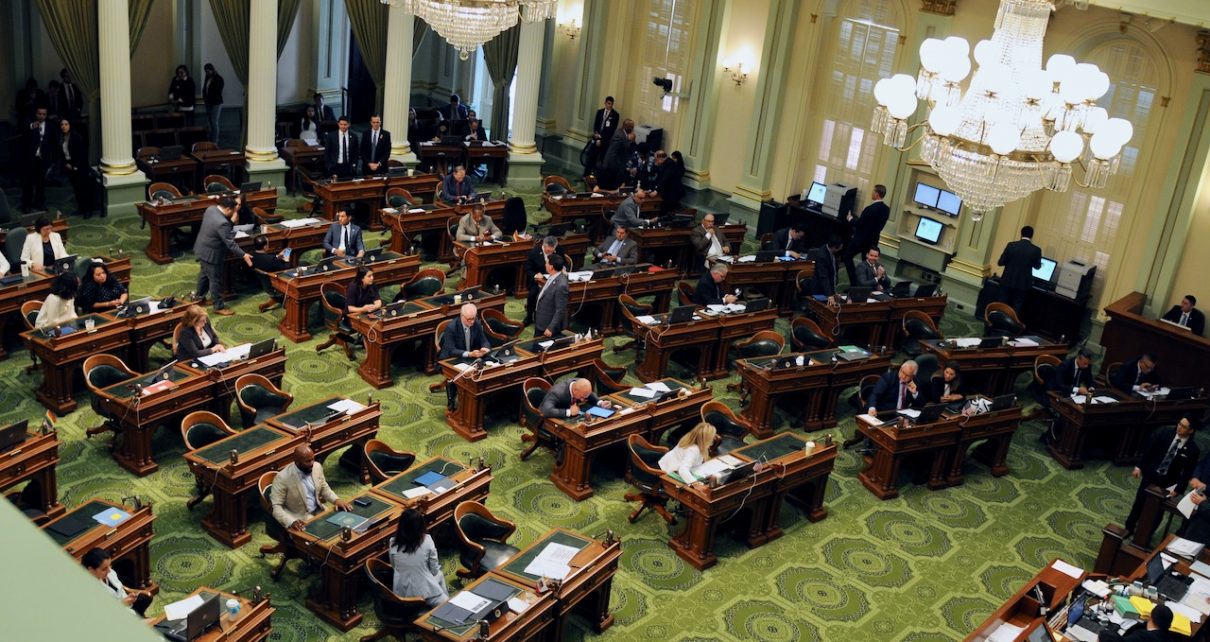
California State Assembly Chamber. (Photo: Kevin Sanders for California Globe)
Should Legislative Grants of Rulemaking Authority Always Include Specific Guidance from the Legislature?
An unconstitutional delegation of authority can occur without it
By Chris Micheli, August 1, 2023 6:54 am
Under constitutional separation-of-powers provisions, generally the laws are enacted by the legislative branch of government, the laws are administered by the executive branch, and the laws are interpreted by the judicial branch. California’s Constitution, in fact, provides specifically for this doctrine in its Article III, Section 3.
With the executive branch charged with administering the law, as well as enforcing it, the state agencies and departments that administer the law need to engage in rulemaking activities, which are quasi-legislative in nature. This power to make the law (through regulations) is similar to that of the legislative branch of government. The legislative branch grants by enacting a statute, or delegates, this power or authority to make laws.
Generally, when this authority is delegated to state agencies, the Legislature will articulate guidance in the use of that authority by the state agency. To do otherwise is tantamount to an improper delegation of legislative power. There are numerous state appellate court decisions in this area of constitutional law.
In general, an unconstitutional delegation of authority occurs when the legislature (1) leaves the resolution of fundamental policy issues to others or (2) fails to provide adequate direction for the implementation of that policy. See, for example, Carson Mobilehome Park Owners’ Assn. v. City of Carson (1983) 35 Cal.3d 184, 190.
In that case, the California Supreme Court stated, “An unconstitutional delegation of power occurs when the Legislature confers upon an administrative agency the unrestricted authority to make fundamental policy determinations. To avoid such delegation, the Legislature must provide an adequate yardstick for the guidance of the administrative body empowered to execute the law.”
“Underlying these rules is the belief that the Legislature as the most representative organ of government should settle insofar as possible controverted issues of policy and that it must determine crucial issues whenever it has the time, information and competence to deal with them.”
From early on, the courts in California have noted that the Legislature has power to delegate to a proper authority for the making of suitable rules and regulations for conduct and transactions of any branch. In re Potter (1913) 164 Cal. 735 Nonetheless, the authority of an administrative agency to adopt regulations is limited by the enabling legislation.
In addition, the Legislature may delegate authority to administrative boards to adopt and enforce reasonable rules for carrying into effect the expressed purpose of a statute even though such rules include authorization to exercise discretion in doing so, provided that the discretion is not purely arbitrary and does not amount to a sanction to add to or change a statute or confer on the board a right to determine what law must be in a particular case.
Agencies do not have discretion to promulgate regulations that are inconsistent with the governing statute, or that alter or amend the statute or enlarge its scope. Courts afford quasi-legislative rules the dignity of statutes and, when scrutinizing the validity of such rules, the scope of review is narrowly confined to determining whether the regulation (1) comes within the scope of the controlling statute and (2) is reasonably necessary to carry out the statutory purpose. Slocum v. State Board of Equalization (2005) 134 Cal.App. 4th 969
The following is from a recently-enacted bill in the 2023 California Legislative Session, in which the guidance in the statute was entirely repealed. Instead, the statutory language now only requires the board to adopt and administer specified regulations. Under the prior statute, there was specific language setting forth what was to be contained in those regulations. Query – is this the wrong way to proceed? In other words, this bill removed guidance, while the preferred route to take is to include it.
SECTION 1.
Section 2496 of the Business and Professions Code is amended to read:
2496.
In order to ensure the continuing competence of persons licensed to practice podiatric medicine, the board shall adopt and administer regulations requiring continuing education of those licensees. The board shall require those licensees to demonstrate satisfaction of the continuing education requirements and one of the following requirements at each license renewal:
(a) Passage of an examination administered by the board within the past 10 years.
(b) Passage of an examination administered by an approved specialty certifying board within the past 10 years.
(c) Current diplomate, board-eligible, or board-qualified status granted by an approved specialty certifying board within the past 10 years.
(d) Recertification of current status by an approved specialty certifying board within the past 10 years.
(e) Successful completion of an approved residency or fellowship program within the past 10 years.
(f) Granting or renewal of current staff privileges within the past five years by a health care facility that is licensed, certified, accredited, conducted, maintained, operated, or otherwise approved by an agency of the federal or state government or an organization approved by the Medical Board of California.
(g) Successful completion within the past five years of an extended course of study approved by the board.
(h) Passage within the past 10 years of Part III of the examination administered by the National Board of Podiatric Medical Examiners.
From my perspective, in keeping with a proper delegation of lawmaking authority, an executive branch agency or department should have established guidance, such as that previously provided in the statute in the above example, rather than simply a grant of authority without standards or guidance. This also ensures that the Legislature’s intent is fulfilled in the rulemaking.
- Sabotage Prevention Act - December 14, 2024
- Why Would the Legislature Request? - December 13, 2024
- A Different Type of Legislative Statement? - December 12, 2024




